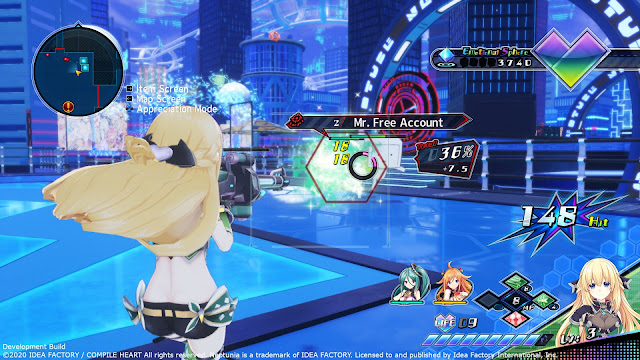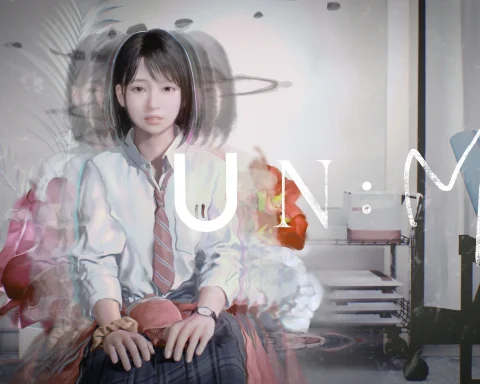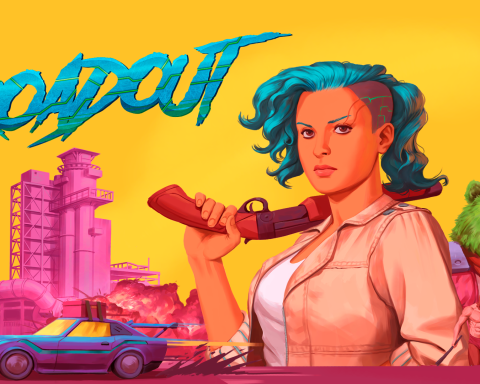Over the last few years, the last vestiges of “the console wars” being anything more than pathetic capitalist sycophancy have washed away. The various players within the industry work together with increasing frequency, and where once there was a point to having a preferred console (because they would end up with large libraries of hugely different games), that’s also so much less relevant these days. The Hyperdimension Neptunia series, which started out as a parody of the console wars when that concept was still fun and quaint, rather than the most toxic corner of fandom, needed to find a new topic to maintain the same positive spirit as the predecessors. That’s exactly what Neptunia Virtual Stars is – it’s a more contemporary and relevant satire than other recent Neptunia games, and because of that it is excellent, even if it is very rough around the edges.
Firstly, the game is a parody of how content-focused the gaming (and virtual idol) industry has become. Again and again, you’re told that your job is to save the world’s content from oblivion, and in doing so, produce a lot of content of your own, which will help you to gain popularity among the locals. The thing is, though, you don’t actually see this content often. You’re told that every step of your adventures is being filmed to fuel the ravenous appetite for content by consumers, but you don’t see cameras around, nor do you do anything but run around doing the normal things that the Neptunia squad get up to. My read on this is that it’s Idea Factory’s little dig at the big problem with content – that what it is doesn’t really matter, as long as there’s a lot of it, that it attracts a lot of eyeballs, and it’s easily consumable. The localisers have even gone as far as to capitalise the “c” for emphasis, and it’s a great touch. Content and art are mutually exclusive and diametrically opposed; art assumes that the quality and meaning of the work is preserved and centred, where content cares only about consumption and reach. Bravo to Idea Factory for taking their own little dig at a frame of mind that too often goes uncriticise, even if that word ended up showing up in the text so much I felt like the script was being deliberately written to push my buttons.
Interestingly, and as something of a side note, content is a word that doesn’t often show up in Japanese games discourse – at least, nowhere near to the same frequency as it does in the west, and where it does it’s used in the proper context (i.e. before Bill Gates came along and redefined it in the way that the Silicon Valley techdweebs define it today). I’ve actually wondered at this in the past, and tried to talk to a couple of Japanese game developers about it, and it has always caused some level of confusion. It’s one of those words where the translation in meaning across cultures isn’t direct, and the idea of just producing stuff for consumption, without particular concern to the quality of the stuff and why it is there, tends to bemuse the Japanese creators (at least, the ones I’ve spoken to about this). Idea Factory is essentially presenting an “outsider, looking in” take on content, and that’s why it comes across as so amusing in the script. You can almost read the amusement around the obsession for it that rolls out of every line from Nep Nep and the gang.
The other area that Virtual Stars takes aim at is the modern Internet troll. To summarise quickly, in Virtual Stars these nasty monsters have invaded the alternative universe and, by spreading their nasty messages and negative content, they turn otherwise good, positive, happy content consumers into “Antis” – mindless, drooling trolls that exist for no reason beyond being nasty and tearing everyone else down around them. It’s not subtle, but it’s also entirely appropriate to the current industry circumstances and really quite amusing. It’s also highly amusing to see Idea Factory hold the lane in satirising many of their own players, who apparently don’t realise they’re the butt of the joke. It just goes to show what you can get away with when you’re also flashing the (admittedly gorgeous) panties of a bunch of anime girls in the process. There might be nothing subtle in the way that Virtual Stars satirises the creation and subsequent behaviour of online trolls, but it’s on point and really quite fun, if only because we’ve all seen this stuff play out. It shouldn’t be so funny, given that the seriousness of what actually goes on here, but as with all Neptunia games, the humour is so brazenly balls-to-the-wall that I can’t help but laugh along.
Neptunia Virtual Stars also seems to know that its strengths lie in the storytelling, humour, characterisation and, in general, everything but the gameplay stuff. Cut scenes and narrative moments can go for hours through visual novel-like storytelling before much by way of a new wave of gameplay comes through, and because this game has an absolutely massive cast (there are so many real-world virtual idols that show up in this game), there are a lot of characterisation and interactions that the story needs to work through. For me, the sheer density of humour and over-the-top presentation of the narrative was enough to sustain me, but then I play a lot of visual novels. People who come into this expecting more of the RPG stuff will likely find the pacing disrupted, perhaps to the point of being exhausting.
Now, is this a problem? I’ll say “no,” but a highly qualified one. It’s possible to play through Neptunia Virtual Stars. Even the boss battles, which tend to spike in difficulty dramatically, and introduce some confounding rhythm game mechanics, are playable enough that you can push through them. On another level, a lot of the combat design is pretty entertaining, since enemies retain the Hyperdimension series’ penchant for wacky, silly monster types. Each new area brings new monsters to fight, and progress is rapid enough to be rewarding in that sense. It’s just disappointing that Idea Factory would do away with the combat system of the mainline Hyperdimension series, which, after many iterations, had arrived at something very genuinely enjoyable. Instead, what we have here is something that is so far behind its peers. Mechanically, the shooter characters are inviting comparisons in play style to the likes of Destiny and Borderlands, and the action RPG bits do want to be like Dynasty Warriors and… well, no. Just no. That hasn’t happened. If you’re going to enjoy Virtual Stars then it’s because the characterisation, energy, humour, concept and charm are big and bold enough that they overwhelm the bits where you’re pressing buttons. That happened for me, but those looking for a game and uninterested in the experience beyond that will struggle.
With that being said, it’s nice seeing the series get its mojo back in other ways. It’s the most fanservicey Hyperdimension Neptunia we’ve seen in a while. There’s always been the risque key art CG or two, but I did have the sense that Idea Factory was trying to tone things down just a little and “go legit,” and this is the first title in a while where you’re going to get an eyeful of underwear just from the character’s walking animation. God those Goddesses have good taste in lingerie. Especially Noire. Mmmmmmm… I digress. Environments are quite garish, but in comparison to some other recent Neptunia games where you get the sense that the art team has tried to turn that quality down (if only just by a little), here the team really embraces it, and as someone on the stream (above) quite rightfully pointed out – the backgrounds look like they’re taken directly from Japanese TV talk shows. They absolutely are, and it’s an aesthetic all unto itself. I’ve long wondered why I can handle Neptunia’s particular blend of garish, because it’s not usually my thing, but that’s exactly it; I love it here because it reminds me of the wonder that is Japanese TV.
Neptunia Virtual Stars is an intelligent, relevant, topical and timely satire. It does represent a new direction for the series, and is clearly an effort to find a way to stay relevant now that the jokes that previously provided the foundation for the series have lost their relevance. In doing so Idea Factory decided to experiment with the gameplay, and while that wasn’t executed to a particularly fine degree, the heavier focus on narrative and the sheer energy of the whole package means that I found it impossible to remain disappointed by the game’s rough edges. The rest of it was too much of a laugh-out-loud delight.
– Matt S.
Editor-in-Chief
Find me on Twitter: @mattsainsb










